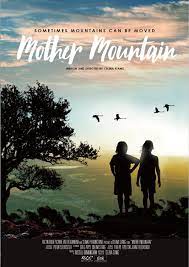
MOTHER MOUNTAIN
Australia, 2021, 105 minutes, Colour.
Emilie Cocquerel, Fayssal Bazzi, Anne-Louisa Lambert, Willow Spears, Jarrah Finnerman, Pip Miller, Damion Hunter, Angeline Penrith.
Directed by Celina Stang.
The mountain of the title is found on the South coast of New South Wales, the Tilba area and there is photography at various times on the coast including Bermagui. The mountain is a sacred site for the First Nations people who live in the area, a sense of affinity with the land and a boating presence.
This film is the first feature film by writer-director, Celina staying, based on her own experiences and her relationship with her family. Her intensity is felt throughout the film through her central character, Selene, played by Emilie Cocquerel.
At the opening of the film, Selene and her husband, Dean (Fayssal Bazzi), who has a diplomatic career, are moving from the city with their daughter, Shani (Willow Spears), a youngster who is resentful of having to move from the city and her friends, loving her mother yet clashing with her. There are ordinary scenes at home, meals, taking Shani to school – though Selene frequently forgets to collect her daughter from school. In fact, the character of Selene is a challenge to the audience, sometimes sympathetic, oftentimes moody, wandering, brooding, intending to write but not doing so, wandering along the shore and encountering a fishing trawler, Jonah the captain (Damion Hunter). She reminisces about trawling on a kibbutz in her young days in Israel. She joins Jonah and finds the experience of fishing and sorting exhilarating. Her husband doesn’t find it exhilarating – nor does her mother. And we are made aware of the tension between mother and daughter with the mother ringing, not leaving a message, Selene angry and hanging up.
While Shani experiences some bullying at school, she makes a friend, Ren (Jarrah Finnerman) and they bond, sharing their experiences, Selene meeting Ren’s mother (Angeline Penrith), an aboriginal family – and happy discovery that Jonah is Ren’s father.
One day, early in the morning, her mother and father turn up, wanting to celebrate Shani’s birthday. There are some explicit angrily confronting sequences between mother and daughter, and whatever difficulties the audience has with Selene, they will have far more difficulties with her mother, a self-righteous dominating woman, tentatively sure that she is right. Her husband takes something of a back seat in the disputes. The mother is played by Anne Louise Lambert (audiences, perhaps, remembering that it is almost 50 years since she was Miranda in Picnic at her Hanging Rock).
How can a family come to some kind of resolution and peace? Concessions on both sides, or is that impossible? The experience of a death and its consequences? Better understanding of husband and daughter? Or, something of all the above.
It is interesting to note that explicitly Jewish themes have not been very strong in Australian films despite the significance Jewish presence in Australia. This film is quite explicit, religious language, memories of kibbutz is in Israel, and prayers and the Jewish meal.
Striking to look at, emotionally involving, and challenging.
- Title, the presence of the mountain, the visuals of the mountain, the sounds of the mountain, tracks within the mountain? Aboriginal themes?
- The location photography, the south coast of New South Wales, towns, beaches, fishing and trawling, restaurants, homes and farms, school? The musical score?
- The first film of the director, her personal story, Jewish background, the linking of Jewish persecution to Australian treatment of aborigines?
- Selene’s story, gradually filling in the background, her grandparents and the Warsaw ghetto, the gas chambers? Her mother, strict, putting her down? Selene’s resentment? Her father, strong presence, weak presence, resentments? Kicking over the traces? Her first marriage, husband alcoholic, the birth of Shani? The separation? Meeting Dean, marrying, their son? His international work? The decision to move to the south coast, the farm, settling in, everything in order? Yet her tensions?
- Selene, her angers, underlying rage and resentment, her mother, her parents, her ex-husband? Moving, wanting to write? Yet unsettled, loving Dean yet not able to manifest it? His needs? Alone, thinking, the beach, the trawler, meeting Jonah, the conversation, her past and the kibbutz, going fishing, exhilarated? And her mother’s and father’s looking down on her for this?
- Selene and her love for her son, his age, tending him? Interactions with Shani, her age, not wanting to move, accusing her mother of not listening to her, wanting the Internet, missing her friends? Yet her love for her mother, sketching, going off alone? Not wanting to go to school, the boy talking to her, and insulting her? The welcoming teacher? Ren, talking with her, friendly, the fort on the beach together, comfortable with each other, his going into the water? His parents, Selene going to visit, talking with Ren’s mother, discovering Jonah his father?
- Shani, fear of horses, the bolting course, her being dared to get on, riding, the parents’ reaction, success?
- Dean, the outing, the dancing, the scuffle with the man eyeing her, the help from the manager of the shop? Dean, talking to the young woman, Selene and her resentment, reactions? This continuing during the birthday party? The happiness of the party?
- The phone calls, from her mother? Their sudden arrival, the effect? The character of Linda, harsh, her manner, controlling? Her husband in the background, strained relationship with his daughter, the effect on his heart, his death? Selene and her grief, the presence of the funeral?
- Dean, the trips, his absences?
- The ex-husband, phoning Shani for her birthday, taking her from school, Selene confronting them?
- The aftermath of the funeral, her mother breaking down, talking, her mother looking dishevelled, in the rain, their bonding? Shani and the three generations of women?
- Hopes, her writing, the family, ran in Shani playing? A future?